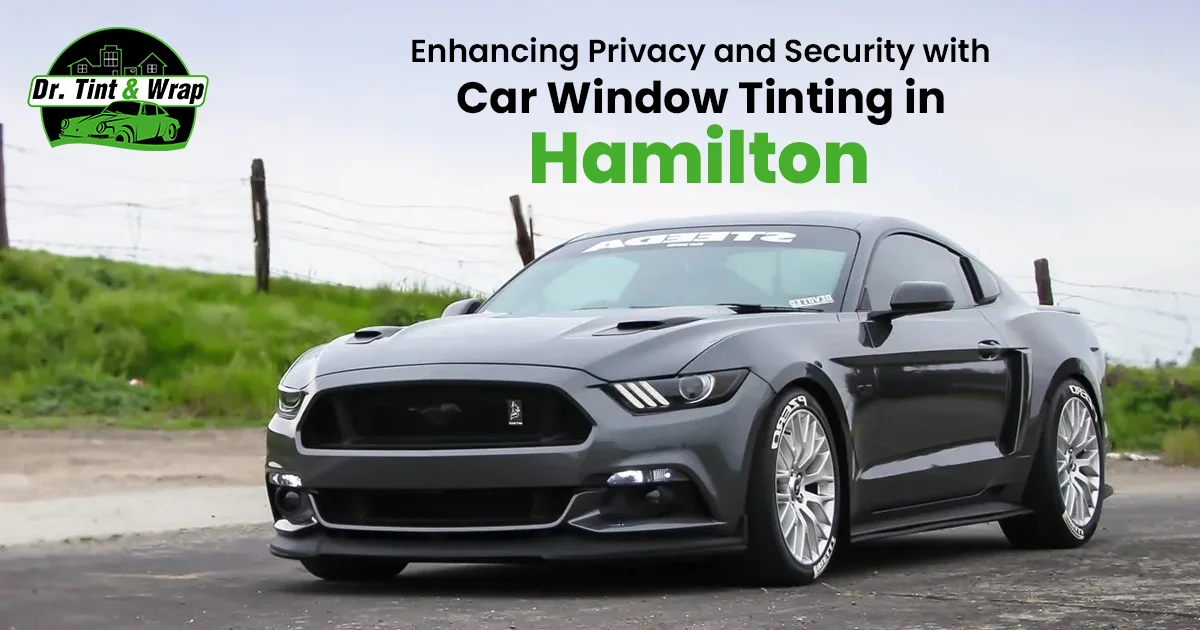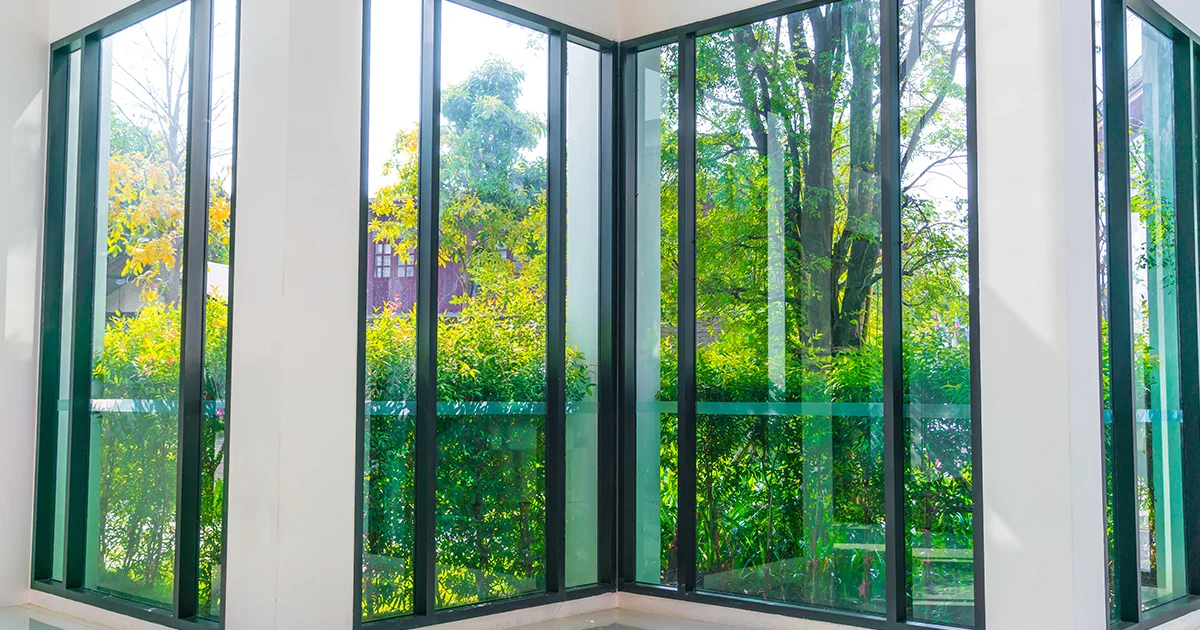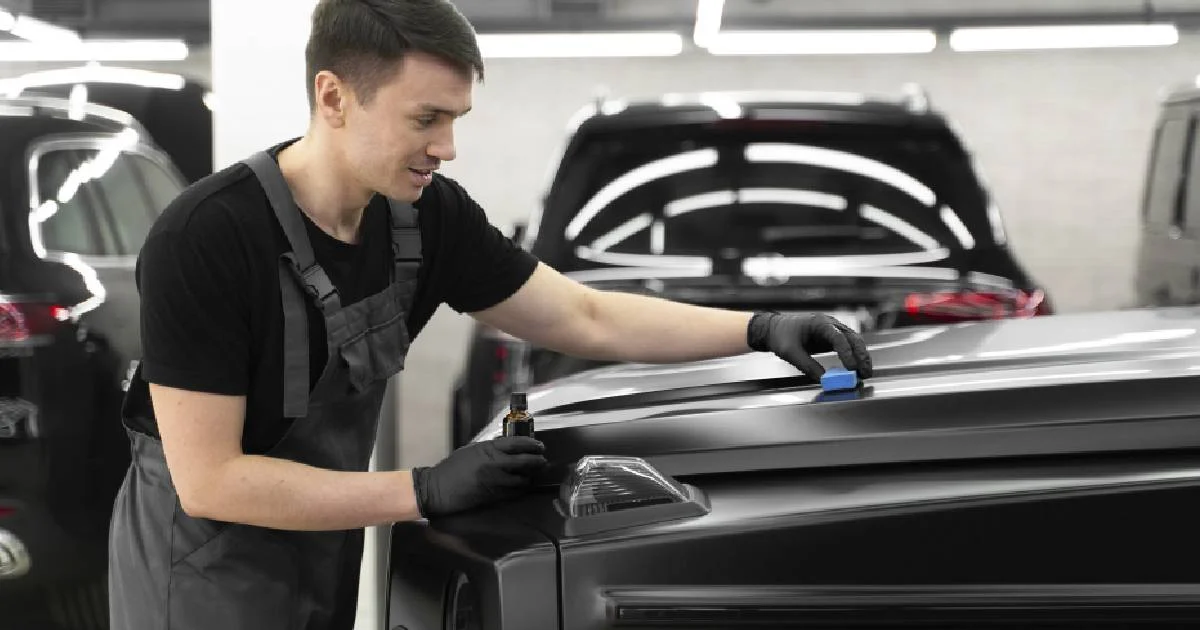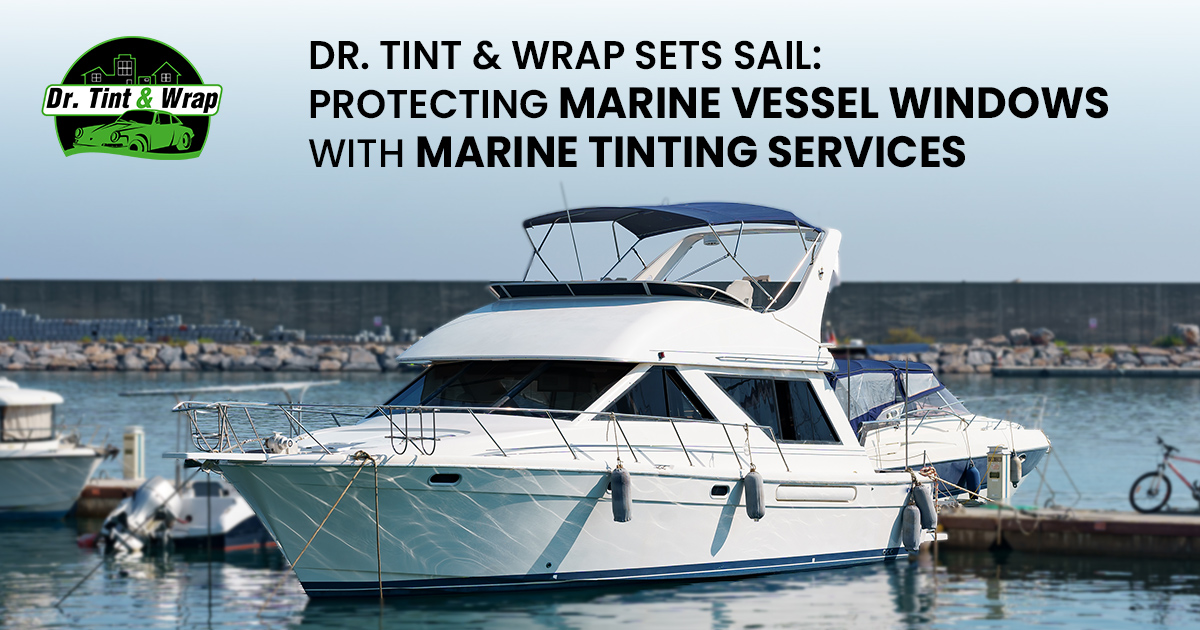
Enhancing Privacy and Security with Car Window Tinting in Hamilton
31 Jul 2023, By AdminCar window tinting has become increasingly popular in Hamilton and for good reason. Apart from its aesthetic appeal, car window tinting offers a range of benefits, including enhanced privacy and security. In this blog, we will explore how car window tinting can provide an added layer of privacy and security for vehicle owners in Hamilton. So, if you're considering tinting your car windows in this vibrant city, read on to discover the advantages and important considerations.
1. Protecting Your Privacy
Car window tinting offers a valuable shield against prying eyes. Whether you're driving through busy streets or parked in a public area, tinted windows can greatly reduce visibility into your vehicle's interior. This added privacy is particularly advantageous when you have valuable belongings or personal items that you'd rather keep out of sight.
2. Deterrence against Theft
The darker tint on car windows can act as a deterrent against potential theft. Tinted windows make it more difficult for thieves to see inside your vehicle and assess if there are any valuable items worth targeting. By concealing the contents of your car, window tinting reduces the likelihood of break-ins and thefts, providing you with an extra layer of security.
3. Protection from Harmful UV Rays
Window tinting not only enhances privacy and security but also offers protection from the harmful effects of UV rays. With New Zealand's high levels of ultraviolet radiation, prolonged exposure to the sun's rays can lead to skin damage, premature aging, and an increased risk of skin cancer. Tinted windows provide a barrier against harmful UV rays, safeguarding you and your passengers while on the road.
4. Enhanced Durability of Interior
Excessive exposure to sunlight can cause fading, cracking, and deterioration of your car's interior surfaces, including the dashboard, seats, and upholstery. Car window tinting helps mitigate this damage by reducing the amount of UV radiation that enters your vehicle. By blocking a significant portion of the sun's rays, tinted windows help preserve the condition and extend the lifespan of your car's interior components.
5. Improved Comfort and Climate Control
Hamilton's weather can be unpredictable, with scorching summers and chilly winters. Car window tinting plays a crucial role in maintaining a comfortable cabin temperature by reducing heat buildup inside your vehicle. Tinted windows minimize the penetration of solar heat, keeping the interior cooler during hot days. Moreover, they also help retain warmth during colder months, promoting a more comfortable driving experience. Car window tinting in Hamilton offers more than just aesthetic appeal. It significantly enhances privacy and security, providing peace of mind for vehicle owners. With the added benefits of protection against harmful UV rays, preservation of interior durability, and improved climate control, tinted windows are an investment worth considering. Dr Tint & Wrap Hamilton is known for delivering unparalleled car window tinting services in Hamilton. Their commitment to excellence, advanced techniques, and premium tinting products set them apart, guaranteeing customers unmatched quality and satisfaction.

How to Choose the Right Window Tint for Your Home in 2023
31 Jul 2023, By AdminIn the world of home improvement, one often overlooked but highly beneficial upgrade is home window tinting. As we step into 2023, the demand for window tinting solutions has grown significantly, driven by increased awareness of their advantages. Whether you're looking to enhance privacy, reduce energy costs, or protect your furnishings from harmful UV rays, choosing the right window tint for your home is crucial. In this guide, we'll explore the key factors to consider when selecting the perfect window tint for your home in 2023.
1. Identify Your Goals
Before diving into the world of window tinting, it's essential to determine your specific goals. Why do you want window tinting for your home? Common reasons include:
- Privacy: Do you want to prevent prying eyes from peering into your living spaces?
- Energy Efficiency: Are you looking to reduce your energy bills by blocking out heat in the summer and retaining warmth in the winter?
- UV Protection: Do you want to safeguard your furniture, flooring, and artwork from harmful UV rays that can cause fading?
- Glare Reduction: Is glare from the sun or nearby buildings affecting your comfort while working or relaxing indoors?
Knowing your objectives will help you choose the right type of window tint to fulfill your needs.
2. Understand Different Types of Window Tints
In 2023, there are various types of window tints available, each with its unique features and benefits. Some of the most common options include:
- Solar Control Films: These tints are designed to reduce heat and glare, making your home more comfortable and energy-efficient. They can also block a significant portion of harmful UV rays.
- Privacy Films: These tints provide enhanced privacy during the day while allowing you to see out. They are perfect for homes with large windows or those in close proximity to neighbors.
- Decorative Films: If you want to add a touch of style to your windows, decorative films come in various patterns and designs. They can provide privacy and aesthetics simultaneously.
- Security Films: These films are designed to strengthen windows and make them more resistant to break-ins and accidents. They can be a valuable addition to your home's security system.
- UV-Blocking Films: If preserving the color and integrity of your furnishings is a priority, UV-blocking films are an excellent choice. They significantly reduce the harmful effects of UV rays on your interior decor.
3. Consider Local Regulations
Before you proceed with window tinting, it's crucial to check your local regulations and building codes. Some areas may have restrictions on the type or darkness of window tint allowed, especially for front-facing windows. Compliance with local laws ensures you avoid potential fines or complications.
4. Evaluate Tint Performance
When choosing a window tint, pay attention to its performance metrics, including:
- Visible Light Transmission (VLT): This measures the amount of visible light that can pass through the tint. A lower VLT means less light passes through, which can be helpful for glare reduction and privacy.
- Solar Heat Gain Coefficient (SHGC): This metric indicates how much heat the tint can block. Lower SHGC values are better for reducing heat gain during hot months.
- U-Factor: This measures how well the tint insulates your windows. A lower U-factor indicates better insulation, which is crucial for energy efficiency.
5. Seek Professional Installation
While some homeowners may attempt DIY window tinting, it's usually recommended to hire professionals. They have the expertise and equipment to ensure a proper installation that maximizes the benefits of your chosen tint.
6. Request Samples and Consultations
Before making your final decision, request samples of the window tints you're considering. This will allow you to see how they look in your home's lighting conditions and how well they meet your objectives. Additionally, consult with window tinting experts who can provide advice tailored to your specific needs.
In conclusion, home window tinting in 2023 is a versatile and practical solution for enhancing comfort, privacy, and energy efficiency in your home. By understanding your goals, exploring different types of tints, and considering local regulations, you can make an informed choice that brings both aesthetic and functional benefits to your living space. With professional installation and careful consideration, you'll enjoy the advantages of window tinting for years to come.

Exploring Different Types of Ceramic Coatings Available in Hamilton
31 Jul 2023, By AdminCeramic coatings have become a popular choice for car enthusiasts, homeowners, and industrial applications in Hamilton, Ontario. These coatings offer a wide range of benefits, including enhanced durability, heat resistance, and a sleek appearance. Whether you're looking to protect your vehicle's paint, enhance the aesthetics of your home, or improve the functionality of industrial equipment, there are various types of ceramic coatings available in Hamilton to suit your needs. In this blog, we'll explore some of the different types of ceramic coatings and their applications in the Hamilton area.
What Are the Different Types Of Ceramic Coatings?
Automotive Ceramic Coatings:
Nano ceramic coatings are incredibly thin, transparent layers that bond with the paint of your vehicle. They offer exceptional protection against UV rays, acid rain, and environmental contaminants. These coatings are ideal for car enthusiasts in Hamilton who want to keep their vehicles looking pristine.
SiO2 coatings are known for their hydrophobic properties, which make them excellent for repelling water, dirt, and debris. They create a glossy finish and provide long-lasting protection against various elements.
- Nano Ceramic Coatings:
- SiO2 (Silicon Dioxide) Coatings:
- Graphene Coatings:
Graphene coatings are a relatively new addition to the ceramic coating family. They are exceptionally durable and known for their high heat resistance. These coatings are suitable for those who demand the best protection for their vehicles, especially in Hamilton's varied weather conditions.
Benefits of Ceramic Coating in Hamilton
Ceramic coatings create a durable and protective layer on the vehicle's paint surface. This layer acts as a shield against various environmental contaminants, such as dirt, dust, road salt, bird droppings, tree sap, and UV rays. In Hamilton, where winter weather and road salt can be particularly harsh on vehicles, ceramic coatings can help prevent damage and corrosion.
Ceramic coatings provide a long-lasting, high-gloss finish to your vehicle. This shine not only makes your car look impressive but also stays intact for an extended period, reducing the need for frequent waxing and polishing.
Ceramic coatings make it easier to clean your car. Their hydrophobic properties repel water and prevent contaminants from sticking to the surface, making it less likely for dirt and grime to accumulate. This makes washing and maintaining your car in Hamilton more convenient.
- Enhanced Paint Protection:
- Long-Lasting Shine:
- Easy Maintenance:
- Resistance to Chemicals:
Ceramic coatings are resistant to many chemicals, including harsh cleaning agents and road salts. This resistance helps protect your car's paint from the corrosive effects of chemicals and can be particularly beneficial in areas with extreme weather conditions, like Hamilton.
Residential Ceramic Coatings:
Hamilton's climate can be tough on the exterior of homes. Ceramic coatings can be applied to the exterior walls to protect them from harsh weather conditions and pollutants. They also add a glossy finish, giving your home an attractive and clean look.
Ceramic roof coatings are designed to extend the life of your roof by providing a protective barrier against moisture, UV rays, and temperature fluctuations. In a city like Hamilton, where weather can be unpredictable, this is a valuable investment.
- Exterior House Coatings:
- Roof Coatings:
- Window and Glass Coatings:
Window and glass coatings enhance energy efficiency, reduce heat buildup, and make cleaning easier. Hamilton residents can benefit from these coatings by reducing energy costs and making their homes more comfortable.
Industrial Ceramic Coatings:
Industries in Hamilton dealing with high-temperature equipment such as engines, exhaust systems, and industrial machinery can benefit from high-temperature ceramic coatings. These coatings provide thermal insulation and corrosion resistance, prolonging the life of equipment.
Industries that face exposure to chemicals and corrosive environments often use ceramic coatings to protect their assets. These coatings offer a durable and long-lasting solution to prevent corrosion.
- High-Temperature Ceramic Coatings:
- Anti-Corrosion Coatings:
- Wear-Resistant Coatings:
Manufacturing and heavy machinery industries in Hamilton require coatings that can withstand the wear and tear of daily operations. Wear-resistant ceramic coatings are designed to do just that, extending the life of industrial equipment.
In Hamilton, the wide variety of ceramic coatings available cater to the specific needs of the automotive, residential, and industrial sectors. These coatings not only protect surfaces but also improve their aesthetic appeal, making them a valuable investment. Before choosing a ceramic coating, it's essential to consider your specific requirements and consult with professionals who can recommend the most suitable option for your needs.
Whether you want to preserve the pristine appearance of your car, protect your home from Hamilton's ever-changing weather, or enhance the durability of industrial equipment, ceramic coatings offer a versatile and effective solution for residents and businesses in Hamilton. When applied correctly, these coatings provide long-lasting protection and aesthetic benefits, making them a worthwhile investment for those looking to maintain the quality and appearance of their possessions.

Dr. Tint & Wrap Sets Sail: Protecting Marine Vessel Windows with Marine Tinting Services
31 Jul 2023, By AdminKia ora, mates! If you're a proud boat owner in the stunning waters of Aotearoa, you know how important it is to keep your marine vessel in top-notch condition. New Zealand is known for its breathtaking coastline and pristine waters, making marine activities a way of life for many Kiwis. But, have you ever thought about the protection of your vessel's windows? Well, worry not, because Dr. Tint & Wrap has come to the rescue with their specialized marine tinting services!
Introducing Dr. Tint & Wrap
Dr. Tint & Wrap is a well-known name in the automotive and residential window tinting industry. They have earned a reputation for providing high-quality tinting solutions that not only enhance aesthetics but also offer numerous functional benefits. And now, they've expanded their expertise to the maritime world with their marine window tinting services.
Why Marine Tinting Matters
Before diving into the details of Dr. Tint & Wrap's marine tinting services, let's understand why tinting is crucial for your boat's windows. Marine vessels, whether you own a yacht, a fishing boat, or a jet ski, are constantly exposed to the harsh elements of the ocean. The intense UV rays, saltwater, and wind can take a toll on your boat's windows, leading to several issues:
1. Sun Damage: Prolonged exposure to UV rays can lead to fading and deterioration of interior materials, including upholstery, dashboard, and electronics.
2. Glare: Glare from the sun reflecting off the water can hinder your visibility, making navigation and fishing challenging.
3. Privacy and Security: Tinted windows not only offer privacy while on your vessel but also act as a deterrent to potential thieves.
4. Temperature Control: Tinted windows help regulate the temperature inside your boat, keeping it cooler in the scorching New Zealand sun.
5. Safety: In the unfortunate event of an accident or collision, tinted windows can help prevent shattered glass from causing injuries. Dr. Tint & Wrap's Marine Tinting Services
Dr. Tint & Wrap understands the unique challenges faced by marine vessels in New Zealand's waters. Their marine tinting services are tailored to address these challenges effectively. Here's what you can expect:
1. High-Quality Films: Dr. Tint & Wrap uses top-grade window films designed specifically for marine applications. These films offer superior UV protection, heat reduction, and glare control.
2. Professional Installation: Their team of experienced technicians ensures that the tinting is done with precision and attention to detail, guaranteeing a seamless finish.
3. Custom Solutions: Every boat is unique, and Dr. Tint & Wrap provides custom tinting solutions to meet your vessel's specific needs.
4. Long-Lasting Results: With their marine window tinting, you can expect the tint to last for years, resisting the harsh conditions of the ocean.
5. Compliance with Regulations: Dr. Tint & Wrap ensures that the tinting complies with New Zealand's maritime regulations, so you can enjoy peace of mind knowing your vessel is legal and safe.
Marine tinting is not just about aesthetics; it's about protecting your investment and enhancing your boating experience. Dr. Tint & Wrap's marine window tinting services bring their expertise to the maritime world, helping boat owners across New Zealand safeguard their vessels from the elements while enjoying the beauty of our pristine waters.
Don't wait until the sun takes its toll on your boat's windows. Contact Dr. Tint & Wrap today to explore how their marine tinting services can elevate your boating experience and keep your vessel looking and performing its best. Protect your boat, protect your investment, and sail the stunning waters of Aotearoa in style with Dr. Tint & Wrap!
